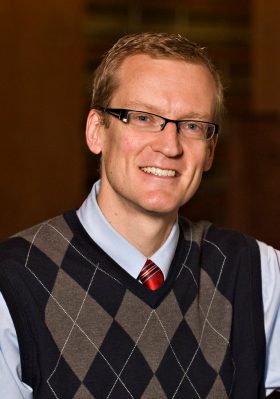The Maurice Jennings Emerging Scholar and an associate professor at Elon University School of Law died Dec. 7, 2016, following a lengthy illness.

UPDATE (12/9/16): A memorial service will be held at 10 a.m. Tuesday, December 13, at St. Andrew’s Episcopal Church at 2105 W. Market Street in Greensboro, North Carolina.
“Let it suffice that Mike’s dedication, even against insurmountable odds, to Elon Law, his students, his work, and his colleagues should inspire and sustain us all,” said Elon Law Dean Luke Bierman. “We are better for knowing Mike but his passing leaves a profound void in our hearts and our community.”
Rich was named as Elon Law’s Maurice Jennings Emerging Scholar in 2015 in recognition of work that had “shown extraordinary promise as a teacher and a scholar.” His work focused on the intersection of emerging technologies and criminal law with a particular interest in the way those technologies prevent criminal conduct.
His scholarship, featured in Elon University’s 2015 President’s Report, also looked at technologies like machine learning that can be used to predict crime and identify likely offenders. He critically examined the use of such techniques to create algorithms that can identify individuals who are likely to be engaged in criminal conduct.
Equally praised for his commitment to educating students, Rich regularly taught courses in criminal law, criminal procedure, evidence, and advanced criminal procedure. More recently, Rich was a tireless leader of Elon’s efforts to redesign and launch its new curriculum and legal education program.
A graduate of Stanford Law School and the University of Delaware, Rich started his legal career at the New York City law firm of Hughes Hubbard & Reed LLP, where his practice focused on First Amendment litigation seeking access to public property and public accommodations.
He later joined the Cincinnati law firm of Vorys Sater Seymour & Pease LLP, where he worked mainly on government fraud litigation under the civil False Claims Act, civil rights litigation, and white-collar criminal cases. Rich also served as law clerk to Judge Susan J. Dlott of the United States District Court for the Southern District of Ohio.
Prior to joining Elon Law in 2010, Rich served as an assistant professor of law at Capital University Law School, where he taught courses in criminal law, evidence, and professional responsibility.
His publications include 2016’s “Machine Learning, Automated Suspicion Algorithms, and the Fourth Amendment” in the University of Pennsylvania Law Review, 2013’s “Should We Make Crime Impossible?” in the Harvard Journal of Law and Public Policy, and 2010’s “Coerced Informants and Thirteenth Amendment Limitations on the Police-Informant Relationship” in the Santa Clara Law Review.
He had presented his work at major legal symposia, conferences, and speaker series across the nation, including the University of Pennsylvania Law School, Washington University at St. Louis, and the Association of American Law Schools’ annual meeting.
Rich is survived by his wife, Amy Minardo, and daughters Auden and Cora Rich-Minardo.
Anyone who would like to talk about their feelings of loss or concern for others may contact Elon University’s Counseling Services at (336) 278-7280 or the Truitt Center for Religious and Spiritual Life at (336) 278-7729. Counselors are available after hours on call by contacting Campus Safety and Police at (336) 278-5555. The Student Life administrator-on-call may also be reached at (336) 278-5555 at any time.


